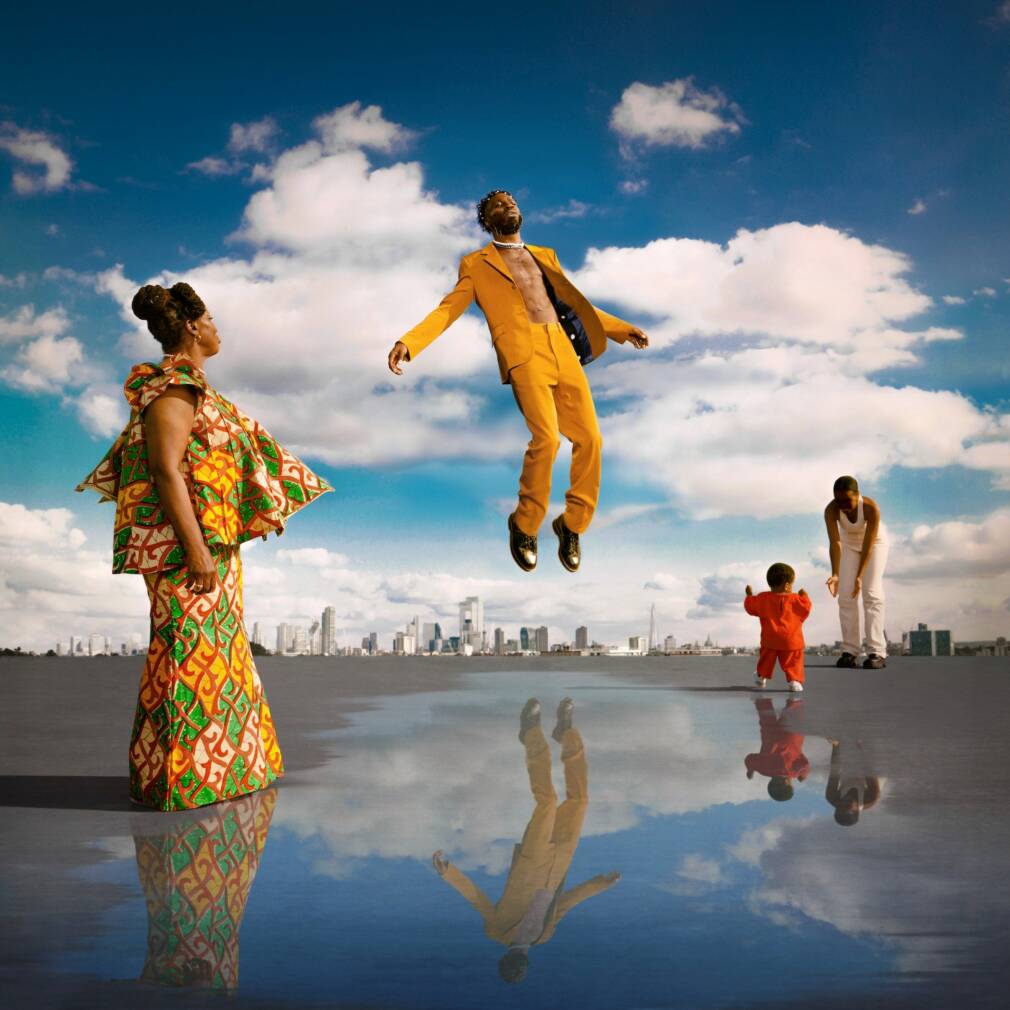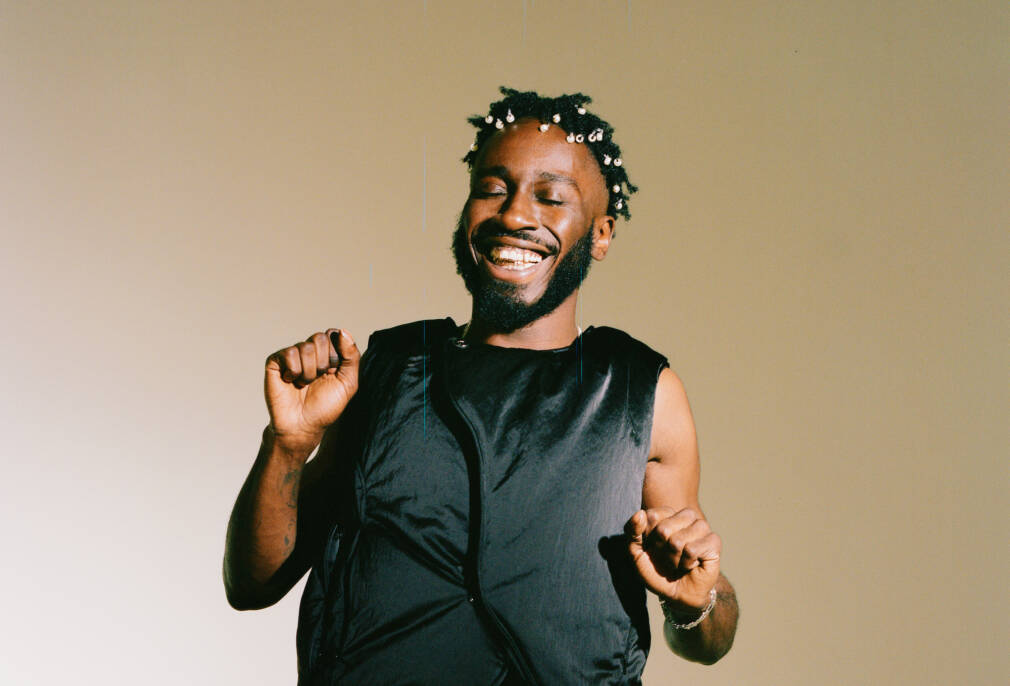Kojey Radical, born Kwadwo Adu Genfi, is a poet at heart. Interviewing Kojey on the eve of the release of his debut album, Reason to Smile, one finds a composed artist with a lyrical sensibility. The conversation flows smoothly from topic to topic, much like the 15 track debut that weaves in and out of narration from Kojey’s Ghanaian born mother. It becomes clear that Reason to Smile is a search not a endpoint, much like the call of the home that never was, a place his parents left behind and later came to inform him musically. Between conversations with his father and mother, trips to his parent’s homeland in Ghana, and instrumental sessions with producer Swindle, the Reason(s) to Smile began to add up.
Though Kojey notes he’s questioned the path in the past, the call of destiny is never too far away. Whether it’s the happy meeting with his cousin, the now alté star Amaarea in Ghana, or the ex fashion student’s album drop landing by chance on Paris Fashion Week, the omens are aplenty. Plus, Kojey has been refining an aesthetic since his debut EP Dear Daisy in 2014 followed by the more musical, A Garden Party, the critically acclaimed 23 Winters, a meditative expression from conversations with his father about immigrating to Britain from Ghana post-independence in 1957, and the more recent success Cashmere Tears.
The list is long, but Kojey’s resumé was missing the LP. Now, that box is checked with another conceptual project that’s fuller and richer, spacier and bassier than the one’s that came before it. As always inviting artists with a similar knack for cerebral lyrics and alternative tunes like Lex Amor, Rexx Life Raj, or Ego Ella May among others.
PAM invites you to dive into Kojey Radical’s Reason to Smile with insight from the man himself.
Can you tell me about the title, “Reason to Smile“?
The title, wasn’t always Reason to Smile. It was “Cannot Be Regret “ taken from a Fela Kuti quote talking about his life experiences and he was saying, if what they are, are experiences then there cannot be regret. It kinda got me thinking because I was in this stage in my life where people would constantly congratulating me things I had done or I was doing et cetera, but I couldn’t see the good. It was almost like asking somebody, “How are you?” You’re not really waiting around for the response.
It’s just an automated ting? I realized I was striving to see all these experiences in my life as reasons to celebrate and reasons to appreciate things. They were just additional things on a checklist to get to success. I think one of the eye opening things that happened for me was becoming a Dad. In the process of that you end up looking at who and what made you. That being my mum. And I guess the rest of it becomes a journey.
How did your mom come to narrate the album?
Basically I finished the album and my mom wasn’t on it. I played it to my boy Zach, and he was like, “ yo I love the album it’s dope but you speak about your mom a lot. And your features speak about their mom a lot. And every time you talk about a lesson you learned you talk about your mom. “ It was almost like this subconscious thing. When I think about lessons, when I think about the guiding voice in the back of my mind, my mom’s voice always appears. It’s always something she said or something I’ve seen her do. A lot of my music or a lot of my bodies of work are kind of centered around this search for strength, and the more I heard both my parents story, the amount of fear in the initial decision to come to the UK, to start again, to raise a family, to work harder than most, to suffer through whatever they had to suffer through, there’s a level of bravery in that that I will never be able to comprehend. I like to use that as the starting point, the source, when we be talking about strength.
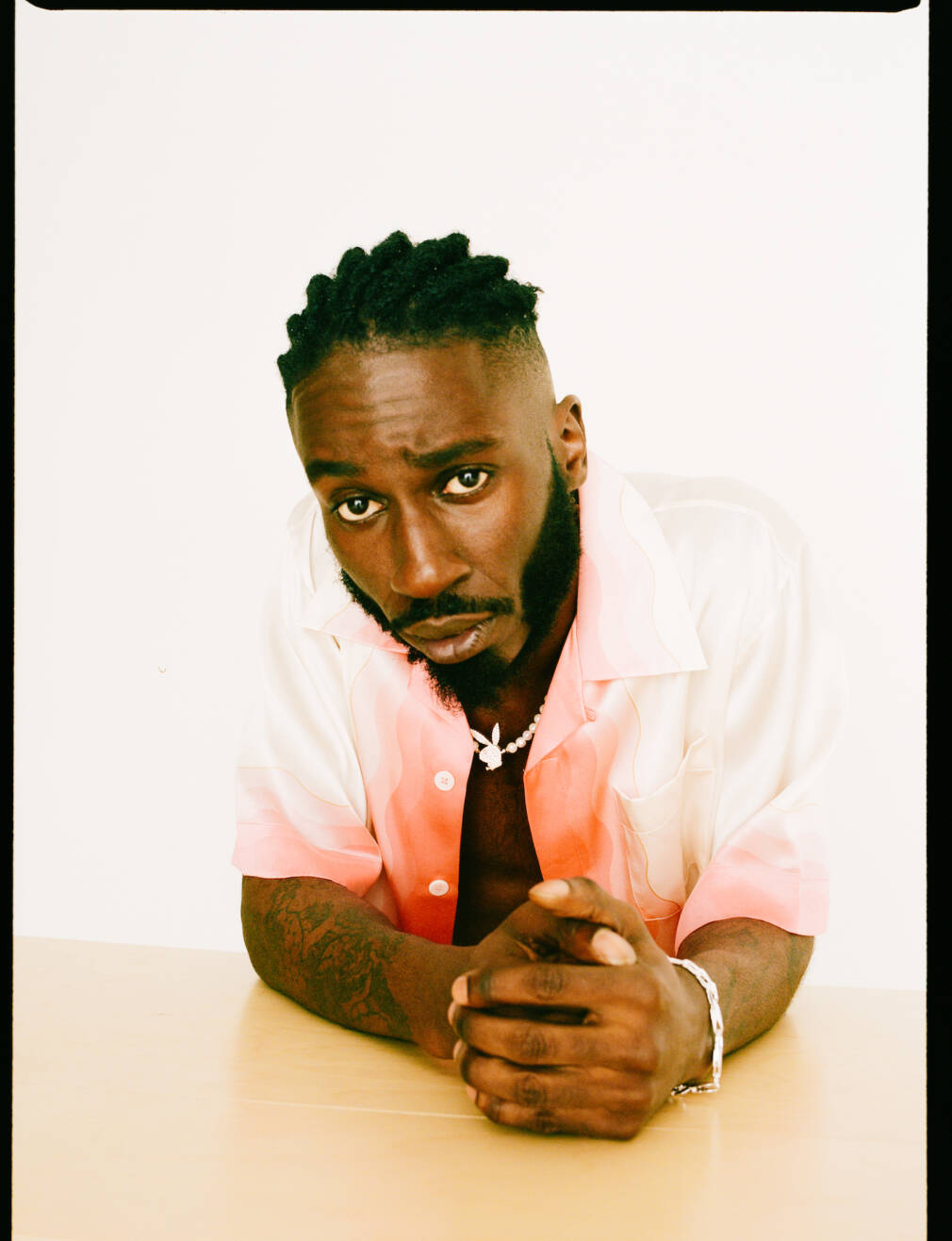
She says she was worried about going to see your teachers. Why?
At the end of the day, she knows her son. She knows what world she sent her son into. Whether it was the case of, “ oh he talked to much or he’s this or he’s that “ to a certain degree, you’re almost anticipating if I’ve done anything bad, but you’re also anticipating a school system trying to stifle and subdue and shrink a personality in its early most developing time. I’m sure when I was a kid I was just expressing myself. Now I’m paid to express myself, but back then I got told to shut up. And you know what’s expected of you what people are thinking in the back of their mind what they’re assuming about you. So I just like to take ownership of those kind of things.
She also mentioned worrying about gangs outside of school.
Yeah, I grew up in the hood but right now it’s gentrified as hell now. But I’m the youngest. My mom has done this rodeo five times over. My brother is a DJ. So like it’s one of them ones where, if I didn’t go through it, somebody did. So I think what was interesting about that anyway was like, she said that she used to stand on the balcony in her night gown, no matter what time of the night it was and she would wait for us to come home because that fear or that worry never leaves you as a parent. It’s real forever.
Do you and your family get to go back to Ghana often?
My mom used to go back a lot but I never really went. I didn’t go back until my adult years and I think over the years in a search for self there are moments of crisis when it comes to identity. When you’re trying to assimilate to a country that you live in, that you know, that is your existence, but feeling like you’re home might be somewhere else. And not really knowing what that feeling is until my adult years even though I really felt that as a kid. So, I think going back to Ghana was just this feeling of going home. And bumping into what was meant for me. Genuinely speaking it was probably one of the most empowering trips that I’ve taken in the last 5 years. Obviously I haven’t been able to go back as much because of the pandemic, but Ghana is a special kind of home. It’s a home that doesn’t need to be explained. You just know where you are as soon as you land.
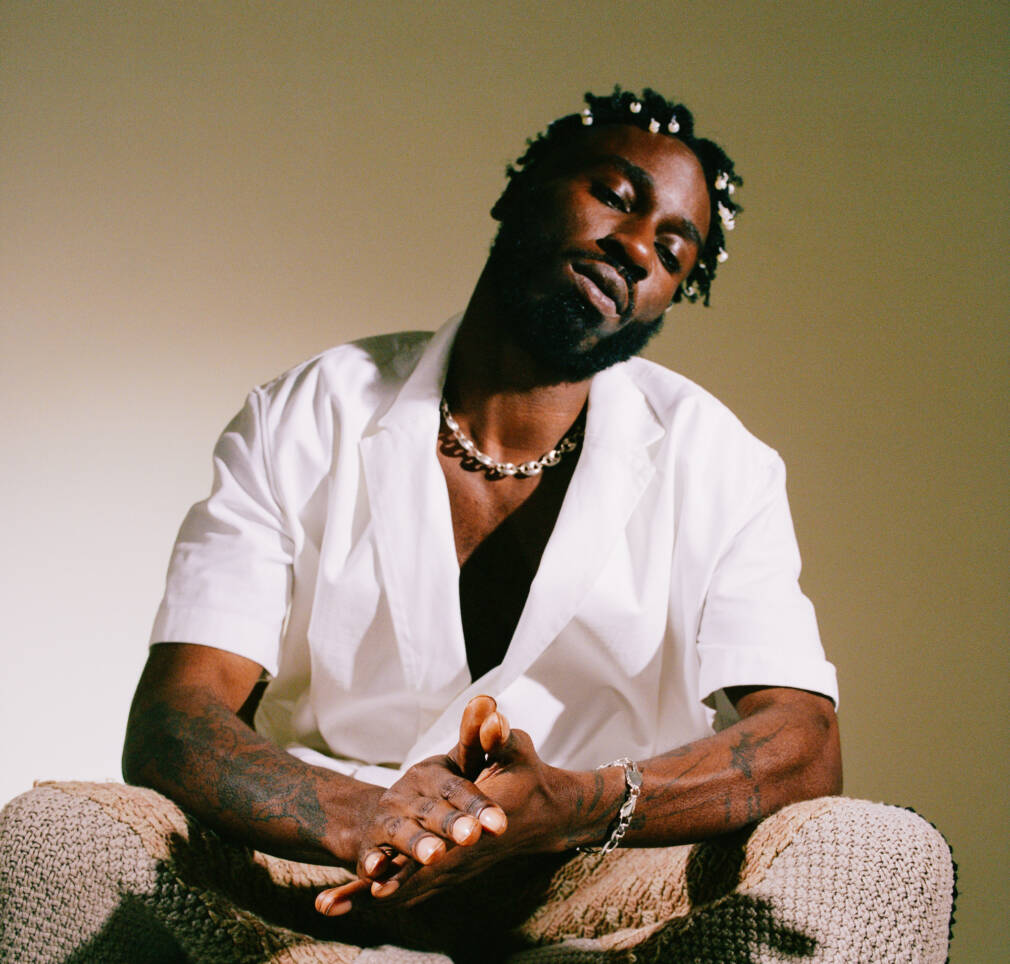
Do you take inspiration from Ghana’s music scene?
Literally like the music scene over there changed the game for me over here. I remember when I went back I got introduced to my cousin Amaarea we connected, we hit it off straight away so I asked her to come to the UK. She helps me work on Cashmere Tears. We finish Cashmere Tears. I help her work on her project. I wrote a song for her and just helped her out with a project in general. That comes out November (Sad Girls Love Money), and it’s the next November that song blows up. In the meantime I see her collaborating introducing me to the African alté movement and scene and that’s why I say it changed my life. Meeting Amaarea was weird, there’s certain conversations that are gonna propel you in a certain direction and she said you just gotta trust in what you do and how you do it. From there it was a confidence booster because there’s been many times I’ve been close to quitting this. But that second wind, especially when it comes from family, is different.
Back to the album, it sound like you’ve got a love for horns!
Do you know what it is? I always loved horns I’ve always loved bass, funk and all of that stuff. Probably my earliest memories of listening to a genre of music was listening to a lot of funk and new jack swing on an old Tasmanian Walkman. Then as I grew up getting further into jazz, hip-hop, triphop lofi stuff. Then one day I meet a man called Swindle and he just unlocked a whole world of live instrumentation for me. It just seemed to fit, you know what I mean? You can’t really argue with somebody on their home instrument. There’s some instruments you feel like, right, this person is at home. A good baseline or a mad horn section…all day. I brought two trombone solos to the game. Everyone should thank me. Honestly. *laughs*
How is it working with Swindle?
He can play. He composes. He’s a mad composer and he’s got people around him that are genuinely keep it going. Neil Waters is another guy that he taps into a lot. What Swindle will do is he’ll get a bunch of session musicians and he’ll record for days and days and get so many different parts and makes beats out of the parts that he’s recorded with session musicians. And then getting them back in when the beat is done to make sense of what he’s done with the rythme of all of it. Giving it a level of attention to detail that you can’t beat.
You’ve called your new sound on this album “Space and Bass”. Can you tell me what that is?
Bass is the basis. The bottom of the song when you hear it. What’s gonna grab you straight away. Space is, is there enough in that record to allow space for lyrics to shine, melodies to go through, to really capture you? There’s always a risk of overdoing it. Of doing too much. So we just wanted to make sure that it’s clean but you feel it deep within yourself.
You also mentioned you wanted to start “moving people physically”.
I think when you listen to music that has stood the test of time, music people constantly go back to for inspiration, when you look at what makes them a banging tune, there’s normally not a lot going on. A mad baseline, and then space. And these two things come together consistently to make banger after banger.
You also studied fashion. Does that continue to inform your work?
I think everything inspires everything. It’s like, if I had to describe the album as a piece of clothing it’d be like a three piece suite, canary yellow. Probably a soft fabric, soft to the touch. Wide pant leg. We gotta get loose, we gotta get to the dance floor. I do think of things as wearable outfits. It’s something that always stays in my mind. It’s just been ingrained in me. Some things you think about, and some things are so natural you don’t think about them. You just know you’re thinking about them.
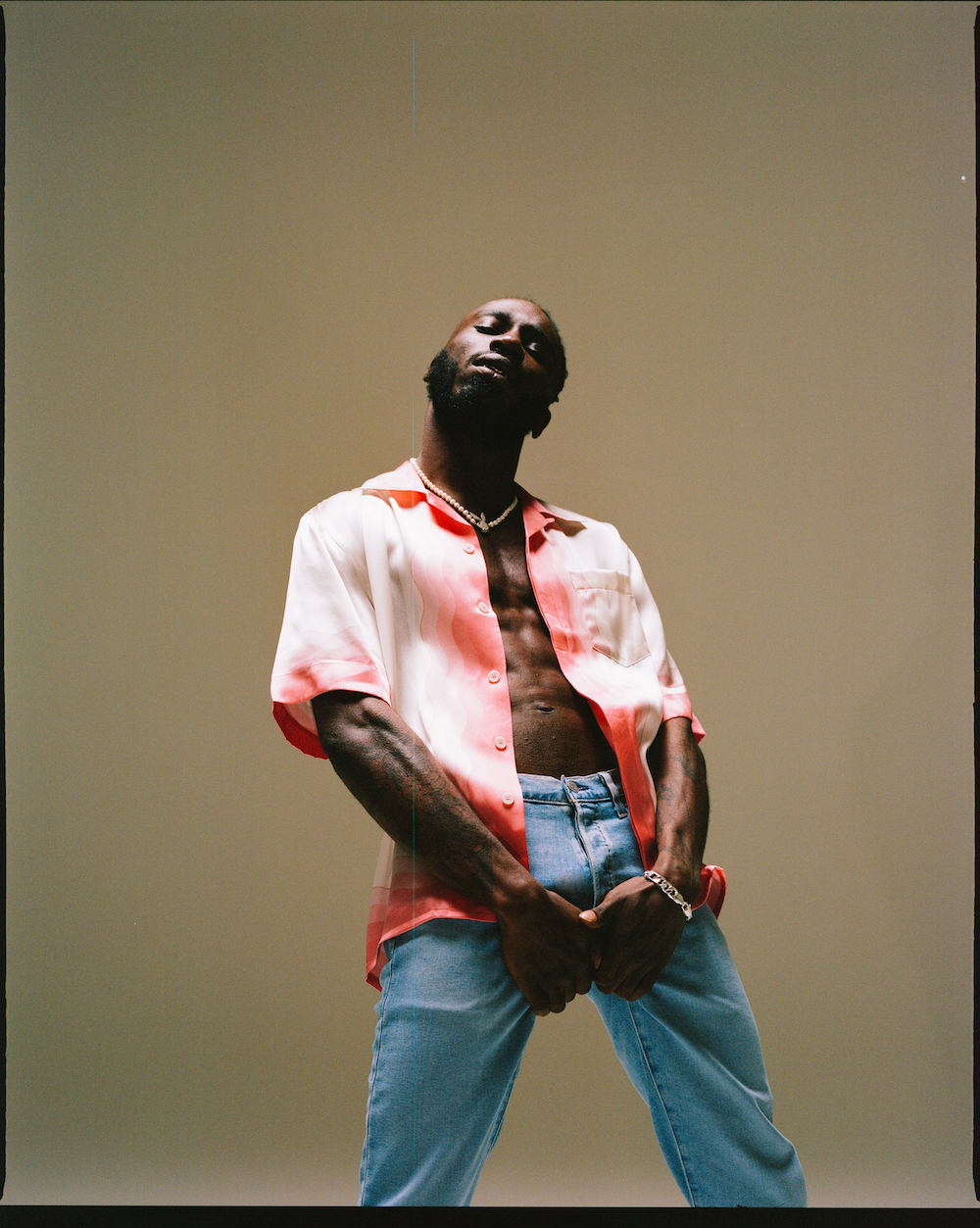
What can you say about the people you’ve invited to be featured on the album?
A lot of the people on the album I’ve collaborated with loads of times. As far back as the beginning of my career. So it was like a no brainer. For me, it was almost like going back to before. Ego Ella May is on my first ever project. Shaé Universe I’ve been working with since In Gods Body. Tiana Major9, we were on the same opening mic circuit together. We used to do acoustic gigs back in the day. Rexx Life Raj, we’ve got records out. Lex is just… If there’s somebody that’s really inspired me, like I have to get back to the pen, I have to show them love, it’s her. As soon as I heard that first record “Mood” I was just like, “ Who are you?What’s going on?“ And we used to just have like real conversation after real conversation. A lot of the time, the people on the album are people I can speak to. So I’m not afraid to be vulnerable in front of them.
And there’s Masego… but no sax.
We had a mad saxophone solo on that that we didn’t use. Swindle says he doesn’t like saxophone solos. Some music shit. But when I do the deluxe version of the album we’ll definitely have the saxophone solo on it.
Anything else you wanna say about the project?
Not really. If you enjoy it you enjoy it. Go buy it, don’t use stream it. Keep good music alive.
Listen to Reason to Smile.
